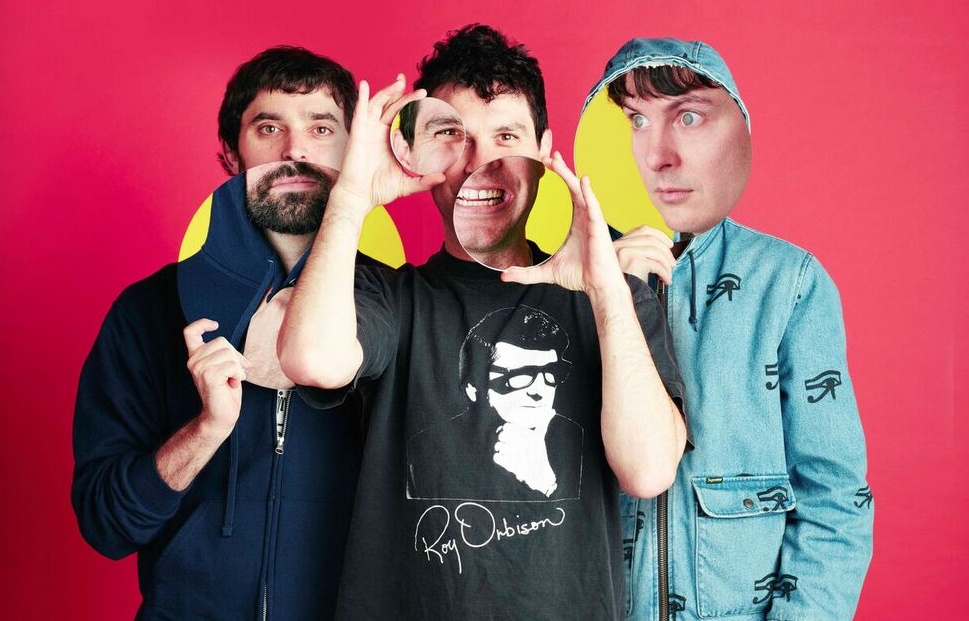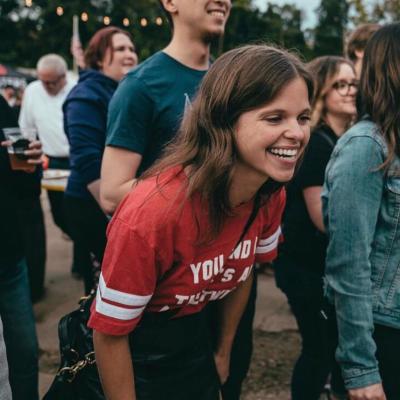
Do you have the same process for creating an album every time around? Each record is so unique and layered.
Sometime we just get together in a practice space and write songs out of jamming. That’s how we did Centipede Hz. But with this album, we weren’t going to be around each other for the song-writing process—we were going to be in our respective cities—so we had to do it more by email for the first phase. Dave and Noah are the songwriters, and usually come up with a basic rhythm. They’ll send out a demo of their instruments, maybe with some rough lyrics or wordless vocal melody. That stuff gets sent around and other people can process it, stick it in GarageBand or Pro Tools, and then add their own parts. We send it back and forth like, ‘Hey, this is what I’m thinking,’ and the next person in line can say, ‘Okay! This is where I’ll play this.’
It’s kind of crazy that with technology these days, you can essentially create an entire album without even physically being together.
We didn’t get through all the songs that way. We got about halfway done and decided we needed to be together. Our friend has a studio in Ashville, NC, and Noah was finishing up a Panda Bear tour there, so Dave and I decided to meet him and spend two weeks in our friend’s basement, hunkering down and working on two songs a day. That’s when we got everything together. Everybody came up with their parts. Everybody was psyched on the songs. And then we went into the studio and actually executed it for real.
What were some of the things inspirations that you guys discussed?
One of the first things was the idea of shorter songs. I had been listening to the first Ramones record. Every song is a very concise statement of energy. We’ve never done a record like that, where it’s a bunch of short songs that are all upbeat and energetic. We’ve always had these more ambient passages on our records—these floaty, amorphous things, like a slow song and a sad song—and we just thought we’ve done that so many times, why don’t we try to make our version of The Ramones record? And for Dave and Noah, the songwriters, that was a challenge. To them, three minutes is usually just one part of a song.
Now that you say that, I can totally hear the urgency of The Ramones in this album.
And we talked about the idea that maybe we’ve exhausted a lot of reverb and crazy processing. For me, I felt like I’m not going to make a bed of noise that a song just rests on top of any more; I’m going to see if I can be more surgical with where I insert myself in the song. Everybody needs to play less, you know? Because, for years, we’ve made a racket, so it’s like, why don’t we work on negative space? That’s something that we’ve always felt we’re not very good at. So we start by setting challenges for ourselves—what have we not done well? And we almost surprise ourselves if we can pull it off.
You’ve definitely created something new that still remains true to Animal Collective.
I think we’re confident now that if we try something new, it’s always going to sound like—we don’t know exactly how to define it—but we know there’s something ‘Animal Collective’ about what we make. A long time ago, we were like, we would never want to get to that point where you have an identifiable ‘sound.’ But now I think that’s silly—it’s actually a good thing. People could say it sounds like another band and that would be more of a bummer.
Almost every Animal Collective review in some way, shape, or form brings up the Beach Boys and Pet Sounds.
We get asked about Pet Sounds all the time. We like that record. We love the Beach Boys. So it’s always been a tricky question to answer, because I don’t want to put down . . .
I mean, yeah, who doesn’t like the Beach Boys?
I think the thing was . . . when the first Pet Sounds reference happened, it was around our fifth album, Sung Tongs, and at the time, we actually were listening to a lot of Beach Boys. We had grown up knowing Pet Sounds and the early surf stuff. But if you’re a record nerd, you eventually start to discover this post-Brian-Wilson-domination era of the Beach Boys, in the early ’70s, where Carl and Dennis did a lot of songwriting, and you have records like Sunflower, 20/20, or Friends. That was actually the era of the Beach Boys that we were listening to a lot. So people would be like, ‘Pet Sounds was a huge inspiration,’ and we were like, ‘Eh, sort of, not really.’
At the end of the day, you guys were still able to forage your own thing out of the shadow of that Beach Boys comparison.
Yeah. No disrespect to Pet Sounds. Pet Sounds was an amazing record. But in terms of our iconic records, the ones that the band kind of holds up and puts on a pedestal and says ‘this had a huge influence on us,’ I don’t think I’d put Pet Sounds as one of them, as much as we love it, or the Beach Boys. I think what’s important for us is, like, The Beatles. The Beatles did a lot of harmonies, too.
Any specific Beatles era?
Everything. It’s pretty easy to go from start to finish. My favorite is probably Revolver. Or Magical Mystery Tour.
Ironically, you actually recorded this album in the Pet Sounds studio, though, right?
We did. And we kind of joked about it. Like, it’s the nail in the coffin. It actually wasn’t our first choice, but the other studios fell through and we were three weeks away from our start date and so excited about recording all the songs that we didn’t want to postpone the record. But in the end, it’s cool to record in a historic space. When we were in the studio, we were like, ‘This is awesome. It sounds amazing in here.’
You’re playing two shows at the 9:30 Club in May. Do you guys still come back or feel tied to Baltimore?
Yes. I do, anyway. My parents live in Baltimore, my wife is from Baltimore, her parents live in Baltimore, my wife’s brother and my brother still live in Baltimore. He’s actually about to open a restaurant in Baltimore. So we go there all the time, you know. Animal Collective’s storage space is up near Josh’s house in Owings Mills. So I feel pretty connected to it. I’ve kind of always gone back for some shows and to see friends and family quite a bit. Dave and Noah are there way less, because they live so far away, so it’s hard for me to speak to their connections to Baltimore. And it’s hard when you’ve been away from a place for a long time: you connect your history with it, and then you come back, it feels a little haunted.
